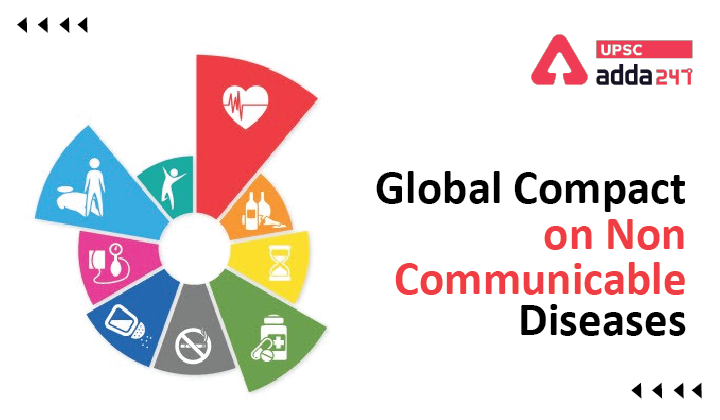Table of Contents
Non Communicable Diseases : Relevance
- GS 2: Issues relating to development and management of Social Sector/Services relating to Health, Education, Human Resources.
Non Communicable Diseases : Context
- The first meeting of the ‘Global Compact on NCDs’ will be held in September 2022. IT will strategise reduction of preventable deaths from diabetes, cancer, heart and lung disease, and promote mental health and well-being.
About Global Compact on NCDs
- A group comprising heads of governments has been formed to fast-track the goal to reduce by a third premature deaths from non-communicable diseases (NCD), the World Health Organization (WHO) announced.
- The decision to form the group was taken at the first International Strategic Dialogue on NCDs and the Sustainable Development Goals, held in Accra, Ghana April 12, 2022.
- The target is part of the United States-mandated Sustainable Development Goals.
- The governments of Ghana and Norway took initiative of forming the first Global Heads of State and Government Group on NCDs.
Global Compact on Non Communicable Diseases: Five key areas of commitment
- Saving, by 2030, the lives of 50 million people from dying prematurely of NCDs by implementing the most cost-effective measures to prevent and control NCDs;
- Protecting 1.7 billion people living with NCDs by ensuring that they have access to the medicines and care they need during humanitarian emergencies;
- Integrating NCDs within primary health care and universal health coverage;
- Comprehensive NCD surveillance and monitoring; and
- Meaningfully engaging 1.7 billion people living with NCDs and mental health conditions in policy-making and programming.
What is non-communicable disease?
- A non-communicable disease (NCD) is a disease that is not transmissible directly from one person to another.
- NCDs may be chronic or acute. Most are non-infectious, although there are some non-communicable infectious diseases, such as parasitic diseases.
About non-communicable diseases
- According to WHO, NCDs are largely preventable and treatable.
- NCDs, however, kill 7 out of 10 people globally from risk factors like tobacco, alcohol, unhealthy diet, physical inactivity and air pollution.
- Nearly 7 million lives could be saved for just $0.84 per person per year from now until 2030.
- This investment would realize more than $230 billion in economic and societal benefits and avert nearly 10 million heart attacks and strokes globally by 2030.
Read current affairs for UPSC





 TSPSC Group 1 Question Paper 2024, Downl...
TSPSC Group 1 Question Paper 2024, Downl...
 TSPSC Group 1 Answer key 2024 Out, Downl...
TSPSC Group 1 Answer key 2024 Out, Downl...
 UPSC Prelims 2024 Question Paper, Downlo...
UPSC Prelims 2024 Question Paper, Downlo...





